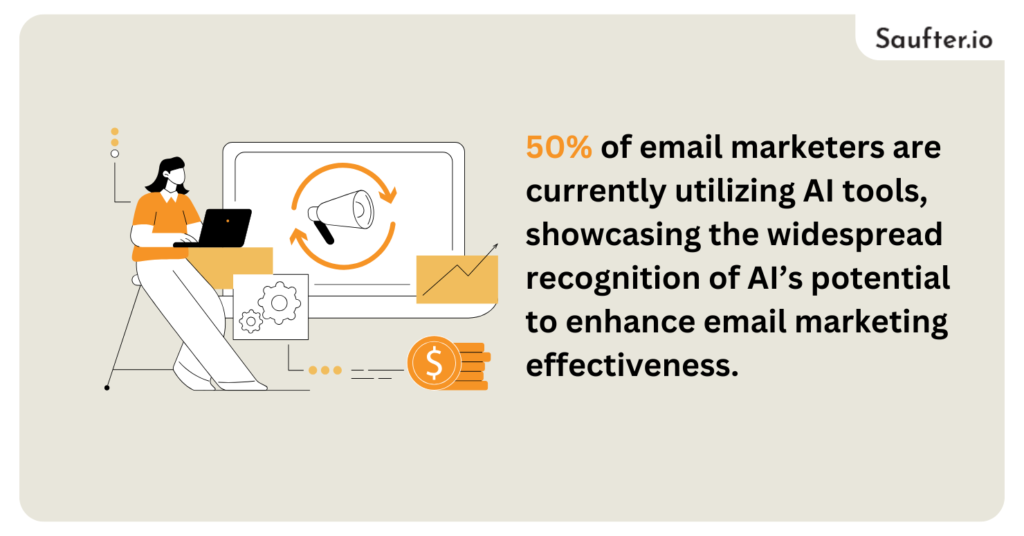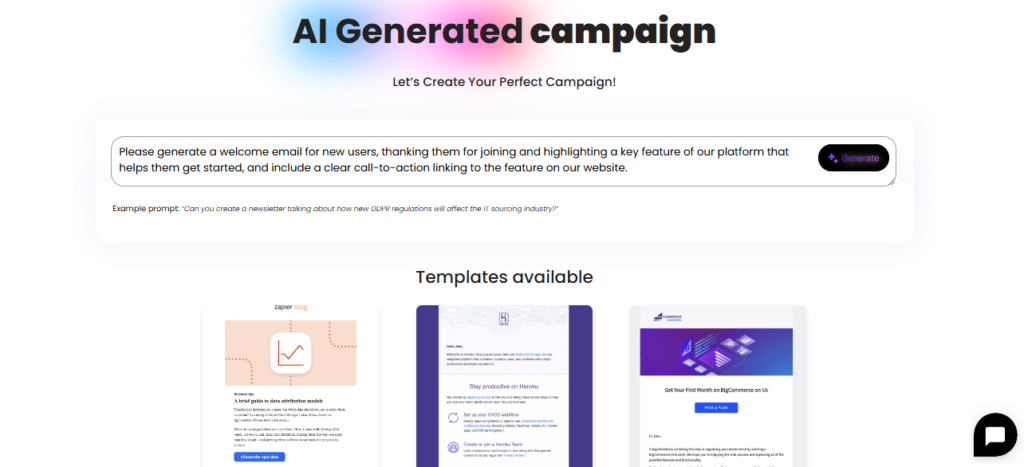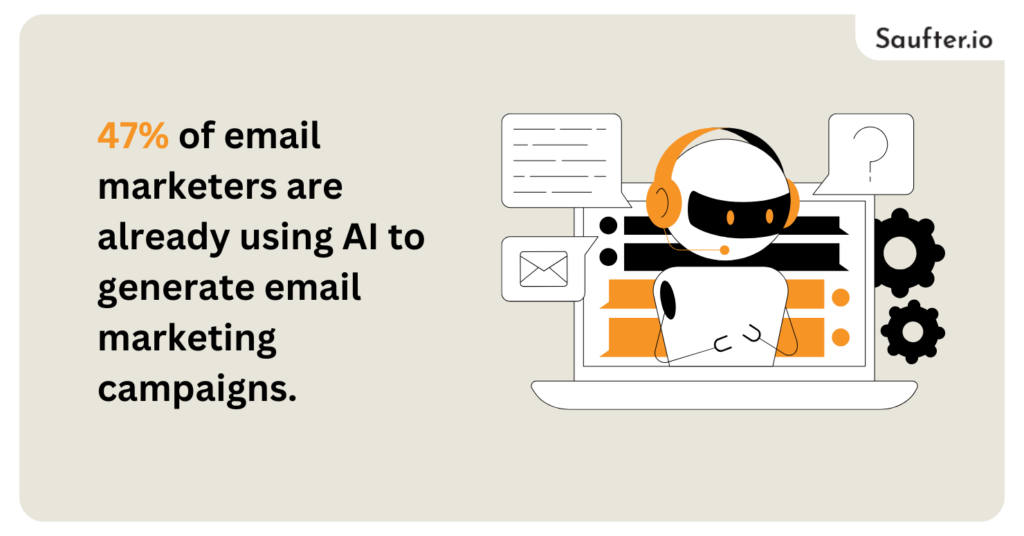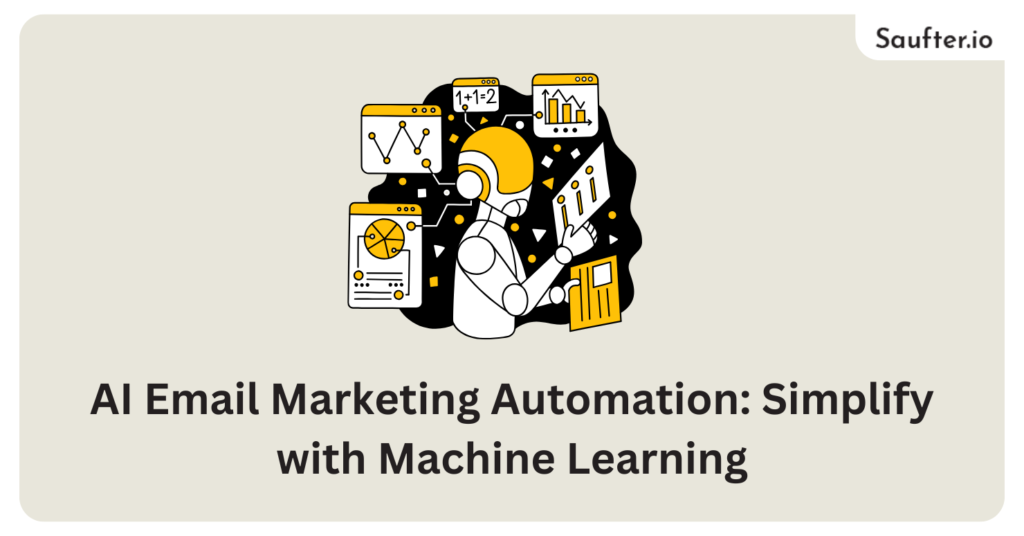Last Updated: December 2025
AI email marketing automation has transformed how businesses engage with their customers using email marketing. With tools like Levity and Saufter.io, marketers can significantly reduce the time spent managing their inboxes while increasing the effectiveness of their campaigns. According to research, 50% of email marketers are currently utilizing AI tools, showcasing the widespread recognition of AI’s potential to enhance email marketing effectiveness.

Artificial intelligence for email marketing automation refers to the integration of AI technologies into email marketing strategies to enhance and streamline the process of managing email communication. By utilizing machine learning and data analytics, businesses can optimize their email campaigns, increase engagement with their audience, and improve overall marketing efficiency. This article delves into the benefits of AI in email marketing and highlights Saufter.io as one of the best AI-based email marketing automation tools on the market.
Key components:
- Personalization: AI algorithms analyze customer data, such as past behaviors and preferences, to create personalized content for individual recipients. This results in more relevant and engaging emails that resonate with the audience.
- Segmentation: AI-driven tools enable marketers to segment their email lists based on various criteria, such as demographics, behaviors, and engagement levels. Segmentation ensures that emails are tailored to specific groups, improving click-through rates and conversion rates.
- Automated Responses: AI can automate responses to common inquiries and customer interactions. By intelligently categorizing incoming emails and providing timely replies, businesses can enhance customer satisfaction and retention.
- Performance Analysis: AI tools offer advanced analytics that track and measure the performance of email campaigns. By analyzing metrics such as open rates, click rates, and conversion rates, businesses can gain insights into what works and can improve future endeavors.
- Predictive Analytics: AI can forecast future customer behaviors and preferences based on historical data. This allows marketers to anticipate customer needs and tailor their campaigns accordingly, leading to increased engagement.
Table of Contents
- Understanding Artificial Intelligence for Email Marketing Automation
- Implementing Artificial Intelligence for Email Marketing Automation
- How Will AI Affect Email and Marketing Automation
- Overview of Machine Learning in Email Management
- Email Marketing Automation Examples
- AI Email Tools
- Best Artificial Intelligence Email Marketing Automation Platform
- Conclusion
Understanding Artificial Intelligence for Email Marketing Automation
1. Streamlining the Email Marketing process
AI significantly streamlines email marketing processes by automating tasks that would otherwise require reasonable time and resources. For instance, AI tools have the ability to handle the customers’ segmentation, which makes the marketers categorize their email list according to the past purchase, browsing behavior or demographic data. This ensures that campaigns are targeted and relevant to the customer’s needs.
- Moreover, AI technology supports the optimization and frequency of email distribution.
- For the customers to open and read the email advanced algorithm is used to determine the email to reach time.
- As a result, using data from these you can reduce the guesswork and maximise the email performance.
2. Analyzing Customer Data
Machine learning algorithms play an important role in reading customer data effectively.
- For instance, they can predict the customer’s growing interest in products using the customer’s interaction and engagement history.
Thus this ability helps in creating campaigns that cater to the needs of the customer.
3. Personalized Email Campaigns
One of the best abilities that stands out in AI email marketing is personalization. Next utilizing customers’ data can help in tailoring specific messages to a particular customer. This might include personalized subject lines, dynamic content, and product recommendations that align with each recipient’s past behaviors and preferences.
- For example, If a customer frequently buys house decorative items, they might receive an email when there is a new arrival or any special promotion or discount available.
Therefore this approach helps the customer engage with content that is relatively personalised by AI.
Implementing Artificial Intelligence for Email Marketing Automation
A. Integrating AI Tools
First, to successfully integrate AI tools into email marketing platforms, businesses should first define their automation goals. Next, this involves assessing what specific outcomes they hope to achieve through automation, such as improved customer retention, increased conversions, or better engagement metrics. Selecting the right AI tools is essential; many platforms offer unique features designed for email marketing, from predictive analytics to customer sentiment analysis.
After identifying suitable AI tools, integration is important:
- First, marketers may need to work closely with IT teams to ensure that existing systems can accommodate new technology.
- Second, training staff on how to leverage AI tools effectively is equally important, as this will maximize the potential benefits of the integration.
B. Monitoring and Optimizing AI Algorithms
In fact, the implementation of AI does not end with integration, the organization must continuously monitor and optimize the customers’ function such as analysing the campaign’s metrics, open rates, click-through rates, and conversion rates, to gauge the effectiveness of AI-driven initiatives.
C. Enhancing Deliverability and Engagement
By analyzing past campaign performance and customer data, AI can help determine the most effective times to send emails, which can lead to higher open and engagement rates.
- Additionally, machine learning algorithms can identify potential issues that may affect deliverability, such as spam filter concerns or unsubscribes.
- As a result of AI optimization, companies can see improved customer interaction with their emails, leading to better retention rates and stronger brand loyalty.
Best Practices for Implementing AI Email Marketing Automation
To maximize the benefits of AI email marketing automation, consider the following best practices:
- Define Clear Goals: Establish what you hope to achieve with email marketing automation, such as increasing engagement or improving response times.
- Segment Your Audience: Utilize AI tools to segment your audience accurately, allowing for more targeted messaging that resonates with different customer groups.
- Monitor Performance: Regularly review analytics provided by your AI tools to optimize campaigns based on customer interactions.
- Embrace Personalization: Use data insights to personalize your messages, enhancing customer engagement and satisfaction.
- Test and Optimize: Continuously A/B test your email campaigns to determine what works best and refine your strategies accordingly.
How Will AI Affect Email and Marketing Automation
This section will examine the anticipated impacts of AI on email marketing and automation. Key discussions may include:
- Increased Efficiency: Explaining how AI streamlines workflows and reduces time spent on repetitive tasks.
- Enhanced Customer Insights: Highlighting how AI can process vast amounts of data to deliver deeper insights into customer behavior and preferences.
- Future Trends: Discussing the evolution of email marketing automation as AI continues to advance and shape strategies.
Overview of Machine Learning in Email Management
Machine learning tools can automate and optimize how we handle emails by analyzing user behavior and categorizing messages intelligently. By leveraging these technologies, users can reduce the time spent on email management and focus on more substantive tasks.
Benefits of Machine Learning in Email Management
1. Automatic Categorization:
- First, machine learning algorithms can recognize patterns in email content, allowing for automatic sorting of incoming messages into categories such as work-related, spam, or newsletters.
- Therefore, this minimizes clutter and enables users to quickly find the emails that matter most.
2. Intelligent Filtering:
- Second, Machine learning adapts to filter unwanted messages instead of relying on static data.
- For instance, If you learn to analyze unwanted email through user interaction, it can detect it more efficiently.
3. Personalized Recommendations
- It can offer personalized suggestions based on users’ email preferences.
- By analyzing past communications, it can recommend responses, automatically draft replies, or identify which emails require immediate attention.
4. Enhanced Productivity
- By automating routine tasks, machine learning empowers users to manage their inboxes more efficiently.
- Therefore this increased efficiency can significantly improve overall productivity and allow individuals to concentrate on higher-priority work.
5. Predictive Insights
- Machine learning can even aid in predicting future email interactions or customer behavior by analyzing past data.
- This can be particularly valuable for sales and marketing teams looking to target customers more effectively.
Email Marketing Automation Examples
Email marketing automation plays a vital role in maximizing the effectiveness of marketing campaigns. Numerous examples highlight the diverse applications of automation, enabling marketers to deliver personalized experiences while saving time and effort.
- Welcome Series Emails: A series of welcome emails sent to new subscribers to introduce the brand with its benefits and discounts.
- Abandoned Cart Recovery Emails: It focuses on recovering the abandoned items in the cart. It acts as a reminder to highlight the product and its discount.
- Browse Abandonment Emails: It targets customers who viewed the products but did not take action. It rekindles their interest and drives conversions.
- Post-Purchases Follow-Up Emails: Follow-up emails can be sent to thank the customers and request product reviews which foster loyalty and long-term relationships with the customer.
- Re-engagement Emails: Re-engagement emails are sent to customers to win back their interest or reminders about the benefits of subscribers.
- Event-Based Emails: Automation can also be employed for event-based campaigns, such as sending birthday greetings with special offers, or holiday-themed promotions.
- Newsletter Automation: Automation can streamline the distribution of newsletters, and enable marketers to send email content related to their previous interaction and relevant to each recipient.
These examples of email marketing automation illustrate how brands can achieve greater efficiency and improved customer engagement through strategic automated communications. By incorporating these practices into their marketing strategies, companies can foster closer relationships with their customers.
AI Email Tools
Various AI email tools are available for email marketing automation. Utilizing machine learning and related technologies, AI email tools enhance various aspects of email management, leading to increased efficiency and productivity. Below are some prominent AI email tools along with their key functionalities:
1. ActiveCampaign

A robust email marketing and automation platform that leverages AI to optimize sending times, personalize content, and improve customer engagement. It’s great for businesses looking for advanced automation and CRM integration.
Key Features:
- AI-powered predictive sending and content recommendations
- Advanced automation workflows
- CRM integration for customer segmentation
- Machine learning-based email personalization
2. Mailchimp

A popular all-in-one marketing platform that uses AI to enhance email campaigns with predictive analytics, automated segmentation, and smart content recommendations. Ideal for small to medium-sized businesses.
Key Features:
- AI-driven subject line and content suggestions
- Smart segmentation and audience insights
- Automated email sequences
- Predictive analytics for campaign performance
3. Brevo (formerly Sendinblue)

A versatile email marketing and automation tool with AI-powered features like send-time optimization, behavior-based personalization, and multi-channel marketing. Best for businesses looking for cost-effective email marketing with SMS and chat integrations.
Key Features:
- AI-powered send time optimization
- Personalized content based on user behavior
- Advanced automation workflows
- Multi-channel marketing (SMS, WhatsApp, chat, etc.)
4. HubSpot Email Marketing

Part of HubSpot’s comprehensive marketing suite, this tool uses AI to personalize emails, optimize subject lines, and track customer interactions. Perfect for businesses that need seamless CRM integration.
Key Features:
- AI-assisted email personalization
- Smart recommendations for subject lines and content
- Drag-and-drop email builder with automation
- Integrated CRM and customer behavior tracking
5. GetResponse

A feature-rich email marketing platform offering AI-powered email creation, predictive sending, and automation workflows. It’s great for businesses focused on boosting conversions and engagement with AI-driven insights.
Key Features:
- AI-generated email templates and content suggestions
- Predictive sending and automated campaigns
- Advanced analytics and conversion tracking
- AI-powered subject line optimization
In general, these AI email tools highlight the considerable benefits that artificial intelligence brings to email management and marketing strategies. By incorporating these tools, businesses can enhance their workflow, improve customer interactions, and achieve better results in their marketing efforts.
Best Artificial Intelligence Email Marketing Automation Platform

Saufter is a leading name in AI email marketing automation, offering various features that simplify the email management process. Its key offerings include:
Features of Saufter
- Smart Categorization: Saufter.io uses machine learning to categorize incoming emails based on content, urgency, and relevance, ensuring that important messages are prioritized.
- Automated Responses: In fact, this platform allows users to set up automated replies, helping businesses maintain communication without manual intervention.
- Detailed Analytics: Saufter.io provides comprehensive analytics that helps users track engagement and campaign effectiveness, enabling data-driven decision-making.
- Integration Capabilities: With the ability to integrate seamlessly with other marketing and CRM tools, Saufter.io ensures smooth operation across multiple platforms.
Conclusion

In conclusion, AI email marketing automation is an invaluable resource for businesses looking to enhance their customer engagement strategies. AI use in email marketing has been gaining traction in retail, as 47% of email marketers are already using AI to generate email marketing campaigns. Thus, Saufter.io stands out as a powerful tool in this field, offering unique features that simplify the process of managing email campaigns.
















